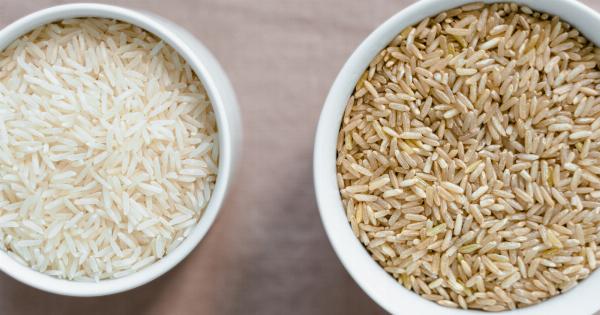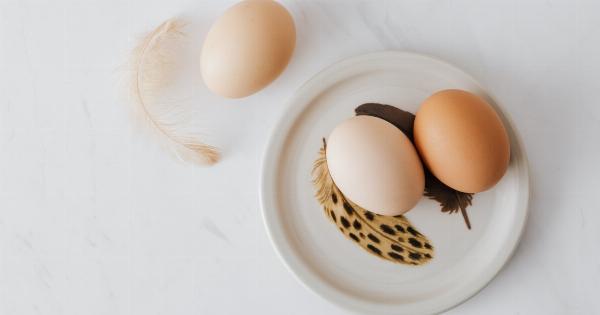Constipation is a common digestive problem that affects people of all ages. It is characterized by infrequent bowel movements or difficulty passing stools.
While there are various factors that can contribute to constipation, including lifestyle choices and medical conditions, nutrition plays a significant role in promoting regular bowel movements. In this article, we will explore which foods and drinks can help alleviate constipation and which ones can worsen the condition.
Fiber: The Key to Relieving Constipation
Fiber is an essential nutrient when it comes to promoting proper bowel movements. It adds bulk to the stool, making it easier to pass through the digestive system. There are two types of fiber – soluble and insoluble.
Both types are important for preventing and treating constipation.
Foods Rich in Soluble Fiber
1. Oats: Start your day with a bowl of oatmeal to increase your soluble fiber intake. Oats are not only delicious but also help soften stools.
2. Apples: This crisp and refreshing fruit is packed with fiber, especially when consumed with the skin. Snack on apples or add them to your salads for a fiber boost.
3. Beans: Incorporating legumes like kidney beans, chickpeas, and lentils into your diet can provide a good amount of soluble fiber, aiding in the digestion process.
4. Citrus Fruits: Oranges, grapefruits, and lemons are not only great sources of vitamin C but also contain soluble fiber that can help relieve constipation.
Foods Rich in Insoluble Fiber
1. Whole Grains: Opt for whole grain versions of bread, rice, and pasta to increase your intake of insoluble fiber. These foods add bulk to the stool, making it easier to pass.
2. Vegetables: Dark leafy greens like spinach and kale, as well as cruciferous vegetables like broccoli and cauliflower, are excellent sources of insoluble fiber.
3. Nuts and Seeds: Snack on almonds, walnuts, chia seeds, and flaxseeds to add more insoluble fiber to your diet. These can be enjoyed on their own or added to various dishes.
4. Bran: Bran cereal or bran muffins are rich in insoluble fiber. Consuming them regularly can help promote healthy bowel movements.
Hydration: An Essential Component
Staying hydrated is crucial for maintaining regular bowel movements. When the body is dehydrated, the colon absorbs more water from the stool, making it hard and difficult to pass.
Drinks that Help with Constipation
1. Water: The simplest and most effective way to stay hydrated is by drinking enough water throughout the day. Aim for at least 8 glasses of water daily.
2. Herbal Tea: Chamomile tea, peppermint tea, or ginger tea can have soothing effects on the digestive system, aiding in relieving constipation.
3. Prune Juice: Prunes or prune juice are well-known natural remedies for constipation. They contain sorbitol, a sugar alcohol that has a laxative effect.
Drinks to Avoid
1. Caffeinated Beverages: Coffee, tea, and sodas that contain caffeine can have a dehydrating effect, leading to constipation. Limit your intake of these drinks.
2. Alcohol: Alcohol is also dehydrating and can disrupt the normal functioning of the digestive system. Excessive alcohol consumption can contribute to constipation.
Other Tips for Relieving Constipation
In addition to incorporating fiber-rich foods and staying hydrated, here are some general tips to help alleviate constipation:.
1. Regular Exercise: Engaging in physical activity can stimulate the muscles in the intestines, promoting regular bowel movements.
2. Avoid Processed Foods: Processed foods are often low in fiber and high in unhealthy fats, which can contribute to constipation. Opt for whole, natural foods instead.
3. Don’t Ignore the Urge: When you feel the urge to have a bowel movement, don’t delay. Ignoring the urge can lead to worsening constipation.
4. Manage Stress: Chronic stress can disrupt normal bowel function. Practice stress-reducing techniques like meditation, deep breathing, or yoga.
Conclusion
Constipation can be a bothersome condition, but by incorporating the right foods and drinks into your diet, you can improve your digestive health and relieve constipation.
Remember to increase your fiber intake through soluble and insoluble fiber-rich foods, stay adequately hydrated, and make healthy lifestyle choices. If your constipation persists or becomes severe, it is advisable to consult a healthcare professional for further evaluation and guidance.




























